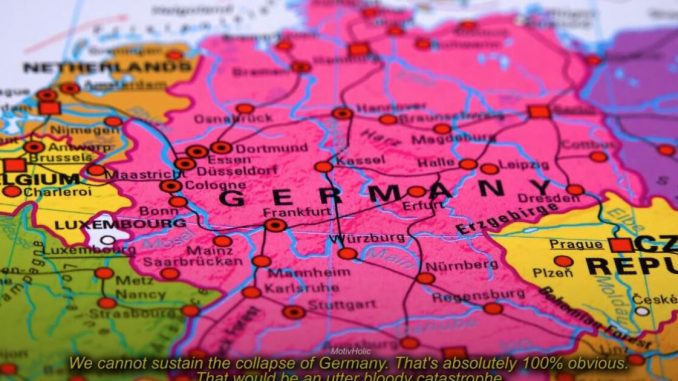
| Published August 22, 2025
Germany, once hailed as Europe’s economic engine, is now confronting one of its deepest downturns in over a decade. A surge in bankruptcies, rising unemployment, and negative growth revisions have shaken public confidence and sparked urgent calls for structural reform.
A Recession That Keeps Deepening
Recent data paints a grim picture. Bankruptcy filings in July reached a ten-year high, with over 4,000 companies collapsing, a nearly 20% increase from last year. Unemployment is also rising, climbing to 2.98 million people, and is expected to surpass 3 million this month. At the same time, Germany’s GDP has contracted for three straight years, with the most recent quarter showing a 0.3% decline—worse than expected.
Industrial production, long the backbone of German prosperity, has fallen sharply. The automotive, chemical, and mechanical engineering sectors—pillars of global trade—are now struggling under high costs, labor shortages, and regulatory burdens.
Merz’s Gamble: Spending Big, Reforming Slow
Chancellor Friedrich Merz has responded with an ambitious plan: nearly €1 trillion in debt-financed spending on defense, infrastructure, and digital modernization. Yet critics argue that spending alone will not solve the deeper, structural issues.
Business leaders from Merck, Mercedes, and other industrial giants warn that excessive bureaucracy, rigid labor laws, and costly EU climate regulations are eroding competitiveness. “Without bold reform,” one CEO cautioned, “Germany risks losing its industrial core.”
Merz has pledged to cut red tape, streamline taxes, and reform labor laws, but progress has been slow. Public frustration is mounting, and surveys show 62% of Germans fear further economic decline.
A Nation at a Crossroads
The downturn is more than economic—it is reshaping Germany’s political landscape. Populist parties such as the AfD are gaining support, tapping into voter anger over rising costs and job insecurity. If the Merz government fails to deliver visible results, it risks a political backlash that could destabilize the broader European Union.
Europe and the World Feel the Impact
Germany’s troubles extend beyond its borders. As Europe’s largest economy, its slowdown is dragging down the entire EU, threatening growth targets and stalling the bloc’s green energy transition. Globally, weaker German exports are rippling through supply chains, while U.S. tariffs and Asian competition intensify the pressure.
Meanwhile, rivals like China see opportunity. By deepening trade ties and investing in struggling German firms, Beijing could expand its influence in Europe at a time of vulnerability.
The Road Ahead
Germany’s crisis is a test of both leadership and resilience. Can Chancellor Merz strike the balance between big spending and deep reform fast enough to restore growth? Or will prolonged stagnation force Europe to adapt to a weaker German economy?
For now, one thing is clear: Germany’s choices in the coming months will not only determine its own recovery but also shape the stability of the European Union and its role in an increasingly competitive global economy.
 Implications
Implications
🔹 Domestic Implications (Inside Germany)
-
Political Pressure on Merz Government
-
Chancellor Friedrich Merz is under growing pressure: despite massive spending, results aren’t visible fast enough.
-
Populist parties like the AfD are gaining momentum, capitalizing on public frustration.
-
If reforms stall, it could trigger a political crisis or weaken Merz’s coalition.
-
-
Unemployment & Social Strain
-
Nearly 3 million unemployed means higher welfare spending, more strain on the state budget, and increased public dissatisfaction.
-
Rising job insecurity may fuel strikes, protests, and migration of skilled workers to other EU states.
-
-
Industrial Competitiveness Threatened
-
Core industries (automotive, chemicals, mechanical engineering) risk losing their global leadership if regulatory burdens and high costs persist.
-
If companies relocate production (to Eastern Europe or outside the EU), it could hollow out Germany’s industrial base.
-
-
Debt and Fiscal Stability
-
Merz’s €1 trillion debt-financed spending could lead to long-term debt challenges if growth doesn’t recover.
-
This risks future austerity measures—similar to what happened after the Eurozone crisis.
-
🔹 European Implications
-
EU Economic Drag
-
Germany is the largest EU economy and the bloc’s main export powerhouse.
-
A German slowdown means weaker EU-wide growth, higher recession risks, and less fiscal room for joint EU initiatives.
-
-
Energy & Green Transition
-
The downturn may stall EU climate targets, as Germany pushes back against costly regulations.
-
This could trigger EU debates on how much regulation industries can bear without crippling competitiveness.
-
-
Rising Euroskepticism
-
Economic pain + EU rules blamed for the crisis = fertile ground for Euroskeptic parties across the continent.
-
Could weaken EU unity at a time of global instability.
-
🔹 Global Implications
-
Trade & Supply Chains
-
Germany is a major exporter of machinery, autos, and chemicals. Declining output impacts global supply chains, especially in Europe, the U.S., and Asia.
-
U.S. tariffs + weaker exports = pressure on Germany to seek new trade partners, potentially reshaping alliances.
-
-
Geopolitical Shifts
-
A weaker Germany reduces the EU’s weight in global politics, giving more leverage to the U.S. and China.
-
Opens space for Eastern Europe (Poland, Hungary, Czech Republic) to gain influence as alternative manufacturing hubs.
-
-
Currency & Financial Markets
-
Continued stagnation pressures the euro and could fuel volatility in EU financial markets.
-
Investors may look toward the U.S. dollar or gold as safer havens—similar to past crises.
-
-
China & Emerging Markets
-
China has been buying massive amounts of gold (something you flagged interest in before).
-
If Germany stays weak, Beijing could exploit Europe’s dependency by deepening economic ties with German companies—buying assets at a discount.
-
 Overall Takeaway:
Overall Takeaway:
Germany’s sharp economic downturn is more than just a short-term recession—it marks a turning point for Europe’s largest economy. With shrinking growth, rising bankruptcies, and unemployment nearing 3 million, the country faces a crisis that government spending alone cannot fix. Structural problems—overregulation, high costs, and rigid labor markets—are eroding its industrial competitiveness and testing public patience.
The implications stretch far beyond Germany’s borders. Within Europe, the slowdown threatens to drag down the entire EU, fuel populist movements, and stall the continent’s green transition. Globally, weaker German exports and supply chain disruptions create ripple effects across the U.S., Asia, and emerging markets, while giving strategic rivals like China more room to expand influence.
At its core, Germany’s crisis is a test of leadership: whether Chancellor Friedrich Merz can pair bold investment with deep reforms fast enough to restore confidence—or whether prolonged stagnation will reshape Europe’s political and economic order.
Germany’s choices in the coming months will not only determine its own recovery but could also define the stability of the European Union and its role in a shifting world economy.





Be the first to comment